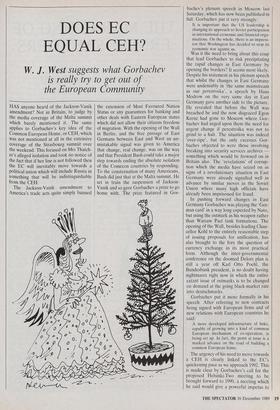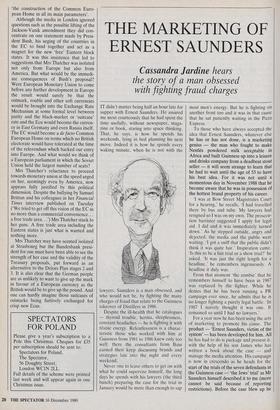DOES EC EQUAL CEH?
W. J. West suggests what Gorbachev
is really try to get out of the European Community
HAS anyone heard of the Jackson-Vanik amendment? Not in Britain, to judge by the media coverage of the Malta summit which barely mentioned it. The same applies to Gorbachev's key idea of the Common European Home, or CEH, which was not mentioned at all in the extensive coverage of the Strasbourg summit over the weekend. This focused on Mrs Thatch- er's alleged isolation and took no notice of the fact that if her line is not followed then the EC will inevitably move towards a political union which will include Russia in something that will be indistinguishable from the CEH.
The Jackson-Vanik amendment to America's trade acts quite simply banned
the extension of Most Favoured Nation Status or any guarantees for banking and other deals with Eastern European states which did not allow their citizens freedom of migration. With the opening of the Wall in Berlin, and the free passage of East Germans between East and West an un- mistakable signal was given to America that change, real change, was on the way and that President Bush could take a major step towards ending the absolute isolation of the Comecon countries by responding. To the consternation of many Americans, Bush did just that at the Malta summit. He set in train the suspension of Jackson- Vanik and so gave Gorbachev a prize to go home with. The prize featured in Gor- bachev's plenum speech in Moscow last Saturday, which has now been published in full. Gorbachev put it very strongly:
It is important that the US leadership is changing its approach to Soviet participation in international economic and financial orga- nisations. On the whole, there is an impress- ion that Washington has decided to stop its economic war against us.
Was it the need to bring about this coup that lead Gorbachev to risk precipitating the rapid changes in East Germany by opening the borders? It seems most likely. Despite his statement in his plenum speech that whilst the changes in East Germany were undeniably in 'the same mainstream as our perestroika', a speech by Hans Modrow on the very same day in East Germany gave another side to the picture. He revealed that before the Wail was breached he and the now disgraced Egon Krenz had gone to Moscow where Gor- bachev had urged upon them the need for urgent change if perestroika was not to grind to a halt. The situation was indeed `over-ripe', but the only excesses Gor- bachev objected to were those involving breaking into security services archives something which would be frowned on in Britain also. The 'revelations' of corrup- tion which the media have seized on as signs of a revolutionary situation in East Germany were already signalled well in advance by similar moves in the Soviet Union where many high officials have already been imprisoned for fraud.
In pushing forward changes in East Germany Gorbachev was playing the 'Ger- man card' in a way long expected by Nato, but using the ostmark as his weapon rather than Warsaw Pact tank formations. The opening of the Wall, besides leading Chan- cellor Kohl to the entirely reasonable step of issuing proposals for unification, has also brought to the fore the question of currency exchange in its most practical form. Although the inter-governmental conference on the doomed Delors plan is still a year off Karl Otto Poehl, the Bundesbank president, is no doubt having nightmares right now in which the entire extant issue of ostmarks is to be changed on demand at the going black-market rate into deutschmarks.
Gorbachev put it more formally in his speech. After referring to new contracts being signed with European firms and of new relations with European countries he said:
A more developed infrastructure of links, capable of growing into a kind of common European mechanism of co-operation, is being set up. In fact, the point at issue is a marked advance on the road of building a common European home.
The urgency of his need to move towards a CEH is clearly linked to the EC's quickening pace as we approach 1992. This is made clear by Gorbachev's call for the proposed Helsinki-Two meeting to be brought forward to 1990, a meeting which he said would give a powerful impetus to `the construction of the Common Euro- pean Home in all its main parameters'.
Although the media in London ignored questions such as the possible lifting of the Jackson-Vanik amendment they did con- centrate on one statement made by Presi- dent Bush, his urging of the countries in the EC to bind together and act as a magnet for the new 'free' Eastern block states. It was this insistence that led to suggestions that Mrs Thatcher was isolated not only from Europe but also from America. But what would be the immedi- ate consequences of Bush's proposal? Were European Monetary Union to come before any further development in Europe the result would surely be that the ostmark, rouble and other soft currencies would be brought into the Exchange Rate Mechanism at some formal level between parity and the black-market or 'suitcase' rate and the Ecu would become the curren- cy in East Germany and even Russia itself. The EC would become a de facto Common European Home on terms which no British electorate would have tolerated at the time of the referendum which backed our entry into Europe. And what would we think of a European parliament in which the Soviet Union held the largest number of seats?
Mrs Thatcher's reluctance to proceed towards monetary union at the speed urged on her, seemingly even by America, now appears fully justified by this political dimension. Despite the bullying by Samuel Brittan and his colleagues in her Financial Times interview published on Tuesday ('We tried to get off this vision of the EC as no more than a commercial convenience... a free trade area...') Mrs Thatcher stuck to her guns. A free trade area including the Eastern states is just what is wanted and nothing more.
Mrs Thatcher may have seemed isolated at Strasbourg but the Bundesbank presi- dent for one must have been able to see the strength of her case and the validity of the Treasury proposals, put forward as an alternative to the Delors Plan stages 2 and 3. It is also clear that the German people are as unlikely to want to give up the mark in favour of a European currency as the British would be to give up the pound. And one can hardly imagine those suitcases of ostmarks being furtively exchanged for crisp new Ecus.



















































 Previous page
Previous page